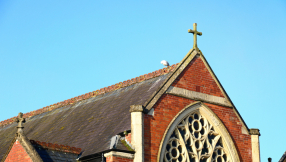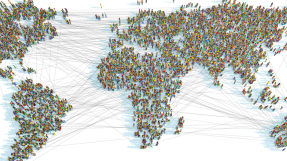
I have been writing about the churches' fresh focus on social justice for a few years now – co-authoring with my colleague Natalie Williams. Our first book, The Myth of the Undeserving Poor, focused on some of the negative media and social narratives towards poverty arising in the recent era of 'austerity'.
The Trussell Trust sent a copy of this book to every one of their foodbank managers. Then in 2017 we wrote A Church for the Poor, which is something of a manifesto for rethinking the life and culture of local churches in order to engage more effectively in outreach to the marginalised in our society. We have been encouraged by the impact of this book as church leaders and activists up and down the country have taken hold of its ideas and started to implement them.
Now we have co-authored a third book, A Call to Act. So why have we picked up our pens again? Let me explain. Natalie and I are both local church activists. We have learnt a lot on the front line. I am on the pastoral leadership of my church in the Midlands and I oversee all our social action projects which are run through a special charity set up by the church. Our church heads up the only foodbank in our town. Natalie, similarly, heads up social engagement for her church on the south coast. Her church also operates a whole range of social projects. We are both activists.
We have learnt a lot through these experiences. We have seen the incredible volunteering capacity of churches, we have seen increasing opportunity for partnership with local agencies, we have seen the witness of the church enhanced, we have discovered the complex challenges of working with the benefits system, and we have seen the depth of human need.
However, there is one thing that has struck us forcibly. In the midst of a volunteering boom there has been very little reflection in church circles about whether our new-found care for the poor should be reflected in our own day-to-day lifestyles as Christians. In other words, can we carry on living unreformed middle class lifestyles as we reach out to those on the margins?
So does this issue really matter? We think it does. In fact we think that the fresh energy in churches to address poverty and serve the poor needs to be matched by a fresh willingness to reassess our personal and family lifestyles. It is this conviction which is the impetus for our new book A Call to Act.
The goal of the book is to equip ordinary Christians to think radically and practically about their lives in the quest to build a 'poverty-busting lifestyle'. One of our key starting points is the life and teaching of Jesus – with a focus on the economic lifestyle implications. We argue that Jesus called us as disciples to live simply and to consciously avoid being drawn into a life of comfort and luxury. We define simplicity as 'basing your standard of living primarily on what you genuinely need to live viably in your society'. Simplicity will have different outworkings in different countries and contexts – but the quest for simplicity is a powerful antidote to the lures of a material culture. Jesus calls his disciples to travel light and trust him for their provision.
One key lifestyle issue we look at is our purchasing habits. We advocate ethical consumerism. We argue that economic justice is a priority in the Kingdom of God and that this is seen clearly in the ministry of both John the Baptist and Jesus himself. It is interesting to note that three major Christian initiatives in recent years have focused on different aspects of economic justice.
Firstly, there has been the fair trade movement which was initiated in the UK largely by Traidcraft and its Christian founders. Secondly, there has been the fight against modern slavery. Christians have been in the forefront of this battle. Beyond the rescue and future welfare of current victims, this campaign has highlighted the place of modern slavery and extreme economic exploitation in the supply chain of many Western consumer goods. Consumers can be hugely influential as they use their choices to avoid goods and businesses implicated in the modern slavery supply chain. Thirdly, the church-led foodbank movement has thrown up an unexpected issue of economic injustice – the huge amount of food waste in both the commercial food chain and, more shockingly, in our own homes.
Our book concludes with a focus on the environment. We note the largely ignored social justice implications of pollution. Then we focus on climate change and make the case that climate change is not just about the preservation of human life or of the biodiversity of the world, important though these issues are. Our focus is on the hugely challenging fact that climate change is a social justice issue.
To put it simply, the main implication of climate change is the intensification of the rainfall cycle. These changes are relatively mild in temperate climates such as our own. However, this is not the case in tropical countries where the intensification of the rainfall cycle is more extreme – leading to both severe flooding and more prolonged drought. This is made more chilling by the fact that almost all the poorest countries in the world are in the tropical areas.
The net result is that climate change will have the severest effect in the poorest countries. So climate change is a social justice issue which we need to face. Every Christian needs to be engaged in the battle against the worst outcomes of climate change.
These are just some of the ingredients for 'building a poverty-busting lifestyle'. We hope you find them both helpful and thought-provoking.
'A Call to Act' was published by David C Cook in September 2020, with each chapter containing a study guide for use in small groups.













